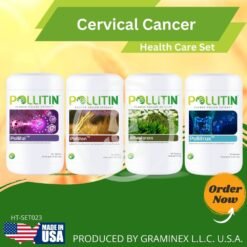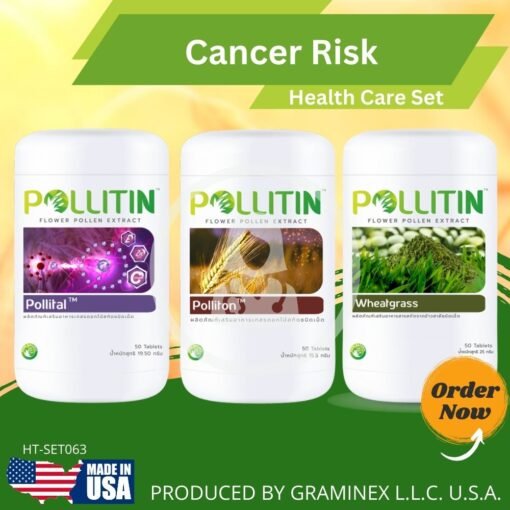-
×
 Cervical Cancer Health Care Set
1 × $205.00
Cervical Cancer Health Care Set
1 × $205.00 -
×
 Strengthening Cartilage Health Care Set
1 × $165.00
Strengthening Cartilage Health Care Set
1 × $165.00 -
×
 Skin Cancer Health Care Set
1 × $229.00
Skin Cancer Health Care Set
1 × $229.00
Cancer
Why is Cancer Increasing?
Why is Cancer Increasing?
Cancer is one of the leading causes of death worldwide and its prevalence is increasing at an alarming rate. According to recent data, approximately one in two people will get cancer at some point in their lives. The reasons for this increase are complex and involve a variety of factors.
The modern lifestyle has been linked to the increasing prevalence of cancer due to several potential risk factors, such as smoking, alcohol consumption, obesity, exposure to air pollution and radiation, and a diet low in fruits and vegetables. Moreover, certain genetic mutations can lead to increased chances of developing certain types of cancer. Additionally, many environmental toxins have been found to be carcinogenic.
Although there is no single cause for the rise in cancer cases worldwide, it is clear that preventive measures should be taken in order to reduce its occurrence.
Risk Factors: Genetics and Environment
The increasing prevalence of cancer is a major public health concern. It’s important to understand the risk factors associated with this disease in order to prevent it from occurring. Two of the main factors that can lead to an increased risk of developing cancer are genetics and environmental exposure.
When it comes to genetic risk, there are certain gene mutations that can increase one’s chances of getting cancer. These mutations may be inherited or developed during a person’s lifetime. Genetics plays an important role when it comes to determining who is more likely to develop certain types of cancers and why some people are more susceptible than others.
Environmental exposures can also increase a person’s risk of getting cancer, such as exposure to UV radiation, air pollution, asbestos, or other carcinogenic chemicals in foods and drinks.
Improper Diet & Lifestyle Habits
The world is facing a major health crisis. Cancer is on the rise, and it’s important to understand why this is happening. Improper diet and lifestyle habits can play a major role in the development of cancer for many individuals.
A poor diet that includes high amounts of unhealthy fats, processed foods, and sugary snacks can increase your risk of developing certain types of cancers. Additionally, not getting enough physical activity or having unhealthy behaviors such as smoking or drinking alcohol can also contribute to an increased risk of developing cancer. It’s essential to be aware of these factors so you can take preventative steps to safeguard your health.
Lack of Exercise.
Lack of Exercise is a Significant Factor in the Growing Rates of Cancer. With an increasingly sedentary lifestyle, more and more people are becoming obese and putting themselves at risk of developing cancer. Recent studies have shown that physical activity can help reduce the risk of several cancers, including colon, breast, and endometrial cancer.
Regular exercise has many benefits such as helping to maintain a healthy weight, controlling blood sugar levels, and reducing stress levels. It also helps to strengthen the immune system which can protect against illnesses like cancer as well as improve overall health and well-being. Studies have found that those who engage in regular physical activity are less likely to develop certain types of cancer or even see their incident rates decrease if they already had it. Therefore, engaging in regular exercise should be seen as an important part of any preventive plan for cancer care.
Pollution & Chemicals
Pollution and chemicals present in our environment are considered major contributors to increasing rates of cancer. As the world population grows, so does our demand for resources, leading to the production of more chemicals and waste by-products that can damage our health. Research has found that air pollution is linked to an increased risk of lung cancer, with outdoor air pollutants like nitrogen dioxide and sulfur dioxide making their way into the lungs of long-term residents in highly polluted cities. Chemicals used in agriculture also pose a significant risk, as many of these products contain carcinogenic components such as arsenic or glyphosate. Additionally, many everyday household items deemed safe may contain toxins that can be dangerous when ingested or exposed over time. From plastics containing BPA to flame retardants found on furniture, these compounds have been associated with higher rates of various types of cancer.
Weak Immune System
A Weak Immune System is an increasingly common factor in the rise of cancer. A weakened immune system can cause a person to be more vulnerable to disease, infections, and even cancer. The immune system is our body’s defense that works hard to prevent infection and illness. When it becomes weak, it can’t protect us as well as it should.
Immunity can be weakened due to a variety of factors such as poor nutrition, lack of sleep, stress, or illnesses like HIV or diabetes. Age also plays a role in weakened immunity; as we get older our immune systems become less effective at fighting off diseases and infections. In addition to age, environmental changes including air pollution and exposure to pesticides have been linked with weakened immunity which could lead to an increased risk for cancer development.
Conclusion: Taking Action to Reduce Risk
In conclusion, understanding why cancer rates are increasing can help people take action to reduce the risk of developing this deadly disease. Education and awareness of lifestyle factors are key components in reducing the risk of cancer. Knowing that environmental factors, such as air pollutants, can also increase the likelihood of developing cancer further stresses the importance of taking steps toward pollution control. Additionally, maintaining a healthy diet, exercising regularly, and avoiding excessive alcohol consumption may help reduce an individual’s chance of getting cancer. Regular medical screenings with your doctor are also beneficial in early detection and allow for swift treatment options for those who do develop cancer. It is important to be mindful when making decisions about health; small changes in daily habits can lead to big changes in overall health outcomes. By educating ourselves about how our lifestyles impact our future health we empower ourselves to make informed choices regarding our personal well-being.

 Strengthening Cartilage Health Care Set
Strengthening Cartilage Health Care Set  Skin Cancer Health Care Set
Skin Cancer Health Care Set 






Recommended Products
Ovarian Cancer Health Care Set
Erectile Dysfunction Health Care Set
Pancreatitis
Splenomegaly